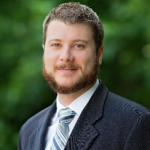As water variability continues to become a concerning issue around the world, how do we interpret the value we place on water resources? How are impacts quantified at fisheries, mitigation banks, or water authorities? Companies are beginning to focus on the concept of water risk, the impacts of too little or too much water, and rapidly developing technological solutions. This symposium will include discussions about the economic valuation of water resources and how water is intrinsically impacted during resource extraction activities designed to derive value out of natural resources. Learn from professionals in the field to see how businesses, government, and academia approach quantifying the value of water!
Schedule of Events
 Can’t make it to the event, but want to view it remotely? A live webcast of the symposium can be found HERE!
Can’t make it to the event, but want to view it remotely? A live webcast of the symposium can be found HERE!
Moderators
Avner Vengosh | Professor of Earth and Ocean Sciences
Martin Doyle | Professor of River Systems Science and Policy
Dan Vermeer | Executive Director, Center for Energy, Development, and the Global Environment
Keynote Speakers
 Margaret M. (Peg) Brady | Coordinator of NOAA Fisheries
Margaret M. (Peg) Brady | Coordinator of NOAA Fisheries
Prior to her position as Coordinator of NOAA Fisheries Ecosystems and Habitat Science Programs, Peg served as NOAA’s senior policy liaison to the National Invasive Species Council and Aquatic Nuisance Species Task Force, and chaired the Interagency National Ocean Policy Ecosystem-based Management Interagency Work Group. Peg joined NOAA in 2003 as the NOAA Habitat Program Coordinator. She served in a number of agency positions such as the NOAA Fisheries Strategic Planning Chief, as well as in federal details including the White House’s Council on Environmental Quality as the coordinator to the U.S. Interagency Committee on Ocean Science and Resource Management Integration in 2007 and 2008. Prior to joining NOAA, Peg served as the Assistant Secretary within the Massachusetts Executive Office of Environmental Affairs, the Director of the Commonwealth’s Coastal Zone Management Program and the Deputy Director for the MA DEP Wetlands & Waterways Program. Peg holds Bachelor and Master of Science degrees from the University of Rhode Island and participated in M.I.T.’s Environmental Policy Group, the U.S. Federal Executive Institute, and Harvard University’s Kennedy School of Government Senior Management Program.
 Emilio Tenuta | Senior Vice President of Sustainability, Ecolab
Emilio Tenuta | Senior Vice President of Sustainability, Ecolab
Emilio Tenuta leads Ecolab’s sustainability work focused on corporate responsibility, internal environmental stewardship and helping customers at nearly 3 million global locations in 40+ industries operate more sustainably. Tenuta’s 35-year tenure at Ecolab includes 25+ years of technical and marketing management experience across industries. He is actively involved in advancing global sustainability focused on water stewardship, serving on the board of the World Environment Center and leading stakeholder engagement with organizations like the Nature Conservancy and the Alliance for Water Stewardship. Tenuta led the development of the Water Risk Monetizer and Ecolab Smart Water Navigator, publicly available online tools to help businesses assess water-related risk and bridge the gap between corporate water goals and results at the facility level.
Panelists
 Richard Roth | Director, MIT Materials Systems Laboratory
Richard Roth | Director, MIT Materials Systems Laboratory
Rich Roth is a Research Scientist at MIT and the Director of the MIT Materials Systems Laboratory. His research is focused on developing assessment methods for evaluating the competitive position of materials and related technologies from both an environmental and economic perspective. Rich’s work spans the entire lifecycle of a materials system, beginning with mining and refining activities, continuing through the manufacture of goods, and finally end-of-life treatment and recycling of materials. He has done extensive work looking at supply/demand balances and price forecasting for a variety of metals. This has included extensive research on future supply opportunities from both traditional land-based sources as well as seabed minerals. He has also developed manufacturing costs models and investigated materials substitution possibilities in the automotive, semiconductor and power distribution sectors. Rich received a PhD in Materials Science & Engineering from MIT in 1992 and a S.B. in Materials Science & Engineering from MIT in 1986.
 Guillermo Auad | Senior Advisor, Bureau of Ocean and Energy Management
Guillermo Auad | Senior Advisor, Bureau of Ocean and Energy Management
Guillermo Auad is the chief of the physical and chemical sciences branch at the US Department of the Interior’s Bureau of Ocean Energy Management (BOEM). At BOEM’s national office he has created national and international partnerships including an award-winning project between the US and Canada on Arctic marine ecosystems. In 2008 Guillermo’s seminar on climate change aired on television to a potential audience of 27 million households in the US, while more recently he was one of the US Government lead reviewers of the IPCC Fifth Assessment Report and a contributing author to the Third National Climate Assessment. Since his arrival to BOEM in 2010, he has focused on project management of different environmental studies.Guillermo’s publications range from biophysical/chemical studies in oceanography and the analysis of observations and modeling experiments in the Pacific and Atlantic Oceans, to the application of socio-ecological systems resilience for effective resource management. Guillermo earned his PhD in Oceanography at Scripps Institution of Oceanography, University of California San Diego.
 Kat Hoenke | Spatial Ecologist, Southeast Aquatic Resources Partnership
Kat Hoenke | Spatial Ecologist, Southeast Aquatic Resources Partnership
Kat Hoenke is a Spatial Ecologist and the GIS Coordinator for the Southeast Aquatic Resources Partnership (SARP), where she works to produce GIS based assessments that identify priority areas for on the ground conservation. Since 2013, Kat has been working to identify and prioritize dams and road stream crossing barriers for removal or remediation throughout the Southeast through SARP’s Southeast Aquatic Connectivity Program. Kat graduated from Duke University’s Nicholas School of the Environment in 2012 with her Master’s of Environmental Management (MEM) degree.
 Amanda Mueller | Environmental Specialist, NC Department of Environmental Quality
Amanda Mueller | Environmental Specialist, NC Department of Environmental Quality
Amanda Mueller is an Environmental Specialist II with the North Carolina Department of Environmental Quality (DEQ) and is currently part of the Water Sciences Section’s Ecosystem Branch. Amanda has worked on a variety of wetland related projects for DEQ for 17 years. The wide range of projects have included site visits for wetland research projects, review of proposed state and federal stream and wetland regulations, summation of state-permitted stream and wetland impacts/mitigation, organization of North Carolina stream and wetland training classes, establishment of the North Carolina Wetland Program Plan and its stakeholder group, coordination of North Carolina’s participation in the EPA’s National Wetland Condition Assessment, and co-creation of ncwetlands.org (a new website all about North Carolina’s wetlands). Amanda received her Master of Science degree from the Department of Resource Management and Policy at the Virginia Institute of Marine Science (VIMS) and her BS in Biology from the College of William and Mary.
 Greg Characklis | Professor of Environmental Engineering, UNC
Greg Characklis | Professor of Environmental Engineering, UNC
Dr. Characklis currently serves as a Professor of Environmental Engineering at University of North Carolina Chapel Hill. His primary research interests involve developing solutions to water resource challenges through systems-based approaches that integrate consideration of both engineering and economic principles, with a particular focus on managing environmental financial risk, water-energy interactions and water supply planning. Dr. Characklis is also Director of the Center on Financial Risk in Environmental Systems, an entity that bridges the Gillings School of Global Public Health and the UNC Institute for the Environment.
 Mark Huang | Co-founder, Sea Ahead Blue Technology
Mark Huang | Co-founder, Sea Ahead Blue Technology
Mark has over 15 years of cleantech venture experience. He co-founded Novus Energy Partners, a US-European cleantech VC fund. Previously, Mark was with GE Capital’s Energy Financial Services group for 10 years primarily focused on strategic cleantech venture investments. In the maritime sector, Mark has worked in shipbuilding and as a naval architect. Mark’s public sector experience includes 13 years as a US Army Reserve officer which included a 2003 mobilization to Iraq as a civil affairs officer. Mark recently served a term as the Economic Development Director for Providence, RI where he focused on the innovation ecosystem and developed an Urban Food strategy. Mark holds an MBA and Masters of International Affairs from Columbia University and a BS in Naval Architecture and Marine Engineering from Webb Institute.
 Jason Lee | Associate Director, Quantified Ventures
Jason Lee | Associate Director, Quantified Ventures
At Quantified Ventures, Jason works to develop outcomes-based financing models that enable faster, more efficient compliance with existing regulations. His work has included developing pricing models for a financial mechanism that allows municipalities to pay for conservation practices on upstream farmland in Pennsylvania and Delaware; the design of a governance / financing entity for nature-based solutions to water quality problems on Cape Cod, MA; and the structuring of Environmental Impact Bonds to implement urban green infrastructure pilot projects in Hampton, VA, and Memphis, TN. Jason graduated with his MEM degree from Duke University’s Nicholas School of the Environment.
B radley Breslow | Regulatory Manager, Resource Environmental Solutions
radley Breslow | Regulatory Manager, Resource Environmental Solutions
Brad Breslow is the Regulatory Manager for RES’ Southeast Region. Brad joined RES as a senior ecologist in early 2016. With over 10 years of experience, Brad provides technical direction and oversight for stream, wetland, buffer, and nutrient mitigation projects. Brad has overseen the development and management of 21 full-delivery mitigation projects with the North Carolina Division of Mitigation Services (NCDMS) and over 20 internal nutrient, stream, and/or wetland mitigation banks across North and South Carolina. For these 40+ mitigation projects, his responsibilities include site feasibility and design coordination, regulatory agency review and approval, staff management, data collection, restoration plan development, and post-construction management. Brad earned a BA in Environmental Science from Carthage College and a Master’s in Geography from West Virginia University.

